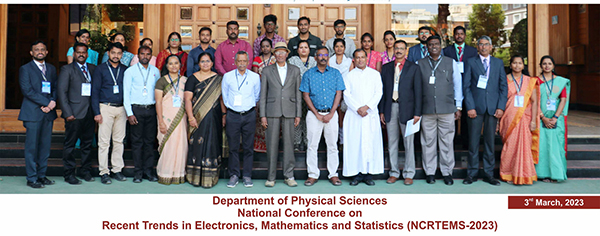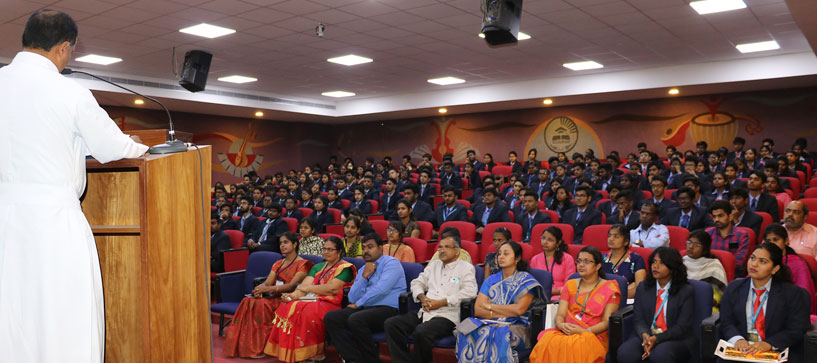
Department Conferences
International Conference on Recent Trends in Material Science
Date: 03 and 04 April 2025
The 5th International Conference on Recent Trends in Material Science, held from April 3rd to 4th, was a grand success. The event was inaugurated by Prof. N. Vijayan, Senior Principal Scientist at CSIR–National Physical Laboratory (NPL), India, and was presided over by Fr. Dr. Augustine George, Principal of Kristu Jayanti College, who delivered the presidential address. The conference featured distinguished speakers, including Prof. Maria Teresa Cuberes from the University of Castilla-La Mancha, Spain, Prof. Praveen C. Ramamurthy from the Indian Institute of Science, Dr. R. Ramesh Babu from Bharathidasan University, and Dr. S. Angappane from the Centre for Nano and Soft Matter Sciences (CeNS), Bengaluru. These experts presented cutting-edge research on topics such as organic polymer nanomaterials for sensors, sustainable solar panels, eco-friendly packaging using Polyvinyl Alcohol – Graphene Quantum Dots, and nanomaterials in biomedical diagnostics and treatment. Participants from across India engaged in insightful discussions, presented their research, and had the opportunity to publish in reputed journals. The conference served as a vibrant platform for academic exchange, innovation, and collaboration in the rapidly advancing field of material science.
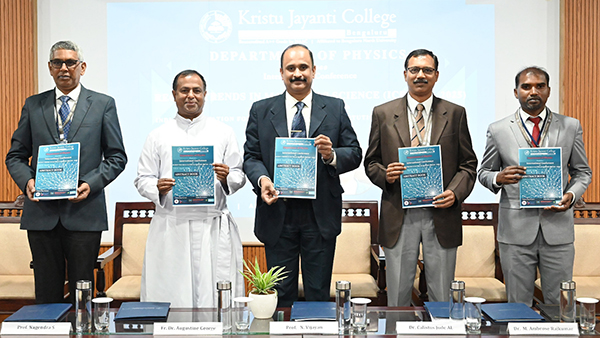
National Conference on Recent Trends in Pure and Applied Mathematics
Date: 30 and 31 January 2025
The Department of Mathematics at Kristu Jayanti College successfully organized the National Conference on Recent Trends in Pure and Applied Mathematics, bringing together scholars, researchers, and academicians from across India. The conference was inaugurated by Dr. S. S. Meenakshi Sundaram, IAS (Retd.), former Secretary, Ministry of Rural Development and Disinvestment, Government of India, and Visiting Professor at NIAS, Bengaluru and Fr. Dr. Lijo P Thomas, Vice Principal and Chief Finance Officer at Kristu Jayanti College, Bengaluru.
The two-day conference served as a platform for knowledge sharing and collaboration, fostering discussions on emerging research trends in mathematics. The event featured six technical sessions, each led by esteemed resource persons from premier institutions such as IIT Kanpur, NIT Trichy, IIIT Bangalore, Bangalore University, and Christ University.
Key Technical Sessions:
Session I: Dr. Pradeep G. Siddheshwar explored "A Simple and Accurate Semi-Analytical Method of Obtaining Eigenvalues of Boundary Value Problems Involving ODEs."
Session II: Dr. V. Lakshmana Gomathi Nayagam presented "Decision Modelling for Imprecise Incomplete Information."
Session III: Dr. Kumbinarasaiah S. discussed "Wavelet Analysis and Its Applications."
Session IV: Dr. B. V. Rathish Kumar spoke on "PDE-Based Image Analysis: Theory, Computation, and Application."
Session V: Dr. B. Ashok delved into "Simple Models for Complex Systems: The Ocean Carbon Sinks."
Session VI: Dr. Maruthamanikandan examined "Computer-Based Analytical and Numerical Solutions."
With over 60 participants from 15 states, the conference provided a dynamic space for interdisciplinary discussions and research advancements. A significant highlight of the event was that the selected papers will be published in Scopus-indexed journals, including the Journal of Combinatorial Mathematics and Combinatorial Computing, Mathematical Methods in Applied Sciences, and the Journal of Organisational and End User Computing.
The conference was a resounding success, reinforcing Kristu Jayanti College’s commitment to academic excellence and research in mathematics.
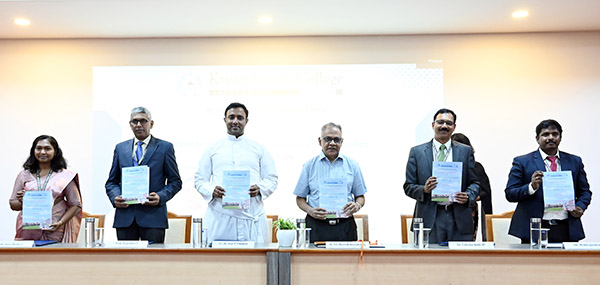
National Conference on Recent Trends in Material Sciences for Electronics and Engineering Applications (RTMSEE-2024)
Date: 15 and 16 April 2024
The National Conference on Recent Trends in Material Sciences for Electronics and Engineering Applications brought together experts, researchers, and enthusiasts from various disciplines. The chief guest, Prof. Kuruvilla Joseph, Outstanding Professor, Indian Institute of Space Science and Technology, Trivandrum, Kerala, India, emphasized the transformative potential of nanotechnology in various fields, emphasizing its impact on improving biomedical devices, electronics, and structural materials. The Conference abstract book was also released by the dignitaries.
Technical Session I: Dr. Nagamony Ponpandian's, Professor and Head, Department of Nanoscience and Technology, Bharathiar University, Coimbatore, India, speech at the national conference was focused on Transition Metal Based Nanocomposites for Electrochemical Water Splitting. He began by introducing the significance of water splitting in renewable energy technologies. Dr. Ponpandian highlighted the potential of transition metal-based nanocomposites in improving the efficiency of electrochemical water splitting.
Technical Session II: Dr. B. Suresha, Head, Centre for Composite Materials Research, Dept of ME, National Institute of Engineering (NIE), Myusru, speech at the national conference focused on the characterization of nanocomposites using Universal Testing Machine (UTM). He began by introducing the significance of nanocomposites in various industries and their potential applications. Throughout his presentation, Dr. Suresha delved into the intricate details of nanocomposite materials and their mechanical properties. He explained how UTM serves as a crucial tool in analyzing the mechanical behavior of these materials at the nanoscale level. Technical Session III: Dr. Gaurav Tomar, Professor, Department of Mechanical Engineering, IISc, Bangalore, captivated the audience as the technical speaker at the national conference, where he delved into the intricate world of Numerical Simulations of Deformable Soft Capsules. His speech began with an overview of the significance of soft capsules in various fields such as medicine, materials science, and biotechnology.
Technical Session IV: Dr. Jyotishkumar Parameswaranpillai, Associate Professor, Department of Sciences, Alliance Univeristy, Bangalore, India, a renowned expert in the field of nanotechnology, delivered a captivating speech at the national conference on "Nanotechnology for Advanced Applications." He began by providing an overview of the principles of nanotechnology and its significance in various industries.
Technical Session V: Dr. Saritha A. Pillai, Associate Professor, Department of Chemistry, Amrita School of Arts and Sciences, Amritapuri, Kerala. In her presentation at the national conference, Dr. Saritha A. Pillai delved into the exciting realm of Two-Dimensional Nanomaterials based Polymer Composites for Advanced Applications. She began by highlighting the transformative potential of these composites in various fields, ranging from electronics to medicine.
Technical Session VI: Dr. Ranjani Viswanatha, Professor, International Centre for Material Science, New Chemistry Unit, Jawaharlal Nehru Centre for Advanced Scientific Research (JNCASR), Jakkur, Bangalore, India. In her captivating speech at the national conference, Dr. Ranjani Viswanatha, an eminent figure in the field of materials science, delved into the groundbreaking potential of quantum dots. She eloquently outlined how quantum dots serve as a strategic asset in revolutionizing various aspects of material science. Dr. Viswanatha highlighted the remarkable properties of quantum dots, including their size-tunable electronic and optical characteristics, which make them highly versatile for a myriad of applications.
Throughout the event, participants exchanged ideas, shared insights, and showcased cutting-edge research in the field of materials science. Attendees gained valuable knowledge about emerging materials, novel fabrication techniques, and their applications in electronics and engineering. One significant outcome of the conference was the identification of key challenges facing the field, such as scalability, durability, and cost-effectiveness of new materials and technologies.
Researchers presented innovative solutions and ongoing projects aimed at addressing these challenges, fostering collaboration and networking among participants. Another notable outcome was the exploration of interdisciplinary approaches, with discussions on the integration of materials science with fields like nanotechnology, photonics, and renewable energy. The conference also served as a platform for industry-academia interaction, facilitating technology transfer and commercialization opportunities for promising research outcomes. Participants discussed potential industry partnerships and funding avenues to support further research and development initiatives. Moreover, the event inspired young researchers and students to pursue careers in materials science and related fields, sparking interest and enthusiasm for future innovations.
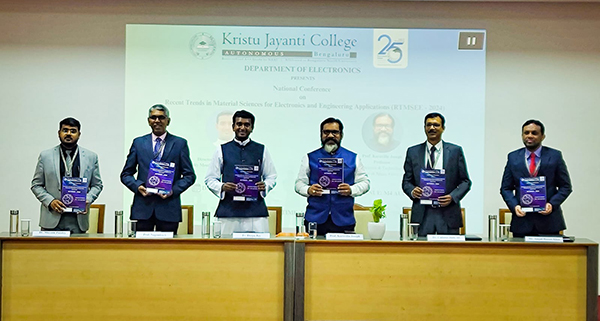
DST-SERB sponsored International Conference on Recent Trends in Materials Science (ICRTMS24)
Date:06 and 07 March 2024
The DST-SERB sponsored International Conference on Recent Trends in Materials Science (ICRTMS- 24) was organised by the department of Physics, Kristu Jayanti College, Autonomous, Bengaluru, during 6 - 7 March 2024. ICRTMS-24 aims at disseminating knowledge in the domain of Materials Science. The main objective was to provide a platform to experts and research scholars from research institutes, academia, and industry to showcase their latest findings in the area of expertise which includes physics and chemistry of advanced materials in Medical, Engineering, Nanotechnology, Environment, Biomaterials and Green Chemistry etc.
On record, we have received 60 research papers in various fields including spectroscopy, crystallography, thin-films, nanomaterials, nonlinear optics, quantum computations etc. which were presented at the conference as oral and posters, and 21 have registered to participate. In total, 81 external delegates registered from Israel, Malaysia, Germany, and various parts of Karnataka and from the neighbouring states Kerala, Tamil Nadu, Andhra Pradesh, Telangana and Maharashtra. There were 72 in-house undergraduate students from I, II and III year B.Sc. Physics class. Totally, 153 have benefitted from the conference. There were 6 esteemed speakers and 4 chair persons for oral and poster presentations to share their knowledge and experiences during the conference. The Indian Association of Physics Teachers (IAPT) sponsored cash prizes for the best paper award from 25 posters and 35 oral presentations. Further, the department has made an agreement with Scientific.Net, as publication partner to publish the accepted papers in Scopus indexed journals/ UGC- Care journals based on author’s preferences. As part of our conference, the participants have visited the Research labs and Prof. C.N.R. Rao Hall of Science at Jawaharlal Nehru Centre for Advanced Scientific Research (JNCASR), on 7th March 2024 from 2 - 6 pm.
Inauguration: International Conference on Recent Trends in Materials Science started with the invocation followed by a welcome address by Dr. Calistus Jude A L, Dean, Faculty of Sciences. A brief overview of the conference was given by the Conference convener Dr. Shivaraj Maidur. In his presidential address Rev Fr. Deepu Joy, Director, Student Welfare Office, highlighted the use of materials science in day-to-day life and its relevance in the development of new technologies, and also congratulated the department. In the chief guest address Prof. Giridhar U Kulkarni, President, JNCASR, Bengaluru encouraged the young researchers to choose research as career. The guest of honour, Dr. Edward Prabhu Amaladass, Scientific Officer, IGCAR, Kalpakkam, Tamil Nadu, emphasized the relevance of research in materials science in the current scenario and use of materials research in all the fields. Then the Conference abstract book was released by the dignitaries on stage. Dr. Ambrose Rajkumar, Conference convener delivered vote of thanks.
Keynote session: Prof. Giridhar U. Kulkarni commenced the conference with an illuminating keynote speech on the revolutionary field of neuromorphic devices and their significance in advancing artificial intelligence (AI). He delved into the intricacies of mimicking the structure and function of the human brain to develop more efficient and intelligent computing systems. Attendees gained valuable insights into the potential of neuromorphic devices to usher in a new era of AI technologies that are energy-efficient, adaptable, and capable of human-like learning.
Technical session-1: Dr. Edward Prabu Amaladass provided a comprehensive overview of his research on the magneto transport properties of topological insulators. He elucidated the unique electronic structure of topological insulators, characterized by robust metallic surface states and insulating bulk states. Attendees gained insights into the potential applications of topological insulators in spintronics, quantum computing, and next-generation electronic devices, driven by their remarkable properties of topological protection as well as high carrier mobility.
Technical session-2: Dr. K. Ramesh delved into the structural dynamics and phase change memory properties of GeTe-based amorphous chalcogenides. He discussed the reversible phase transition between amorphous and crystalline phases in these materials, which underpins their applications in non-volatile memory devices. Attendees gained valuable insights into the fundamental mechanisms governing phase change phenomena and their implications for the development of next-generation memory technologies with higher storage density, faster operation, and lower energy consumption.
Technical session-3: Prof. Nandakumar Kalarikkal captivated the audience with his presentation on the design and applications of novel engineering nanostructured materials. He discussed innovative fabrication techniques such as sol-gel processing, electrospinning, and molecular self-assembly, which enable precise control over the size, shape, and composition of nanostructures. Attendees gained insights into the unique properties of nanostructured materials, such as high surface area, enhanced mechanical strength, and tailored functionalities, driving advancements across various engineering disciplines.
Technical session-4: Prof. Yuval Gefen provided a fascinating glimpse into the intricate world of nanotechnology and its transformative impact on science and technology. He discussed recent developments in nanofabrication techniques, such as electron beam lithography, atomic layer deposition, and self-assembly, which enable the precise manipulation of matter at the nanoscale. Attendees gained a deeper understanding of the potential of nanotechnology to revolutionize fields such as electronics, photonics, and sensing, opening up new avenues for innovation.
Technical session-5: Prof. Vidhyadhiraja N S provided a theoretical perspective on metal-insulator transitions and quantum criticality, shedding light on the complex interplay between electronic correlations, disorder, and quantum fluctuations in condensed matter systems. Attendees gained a deeper appreciation for the rich interplay between quantum mechanics and condensed matter physics, with implications for both fundamental research and technological applications.
Visit to JNCASR and Valedictory: 2 – 6 pm After the completion of all the sessions, delegates were taken to Jawaharlal Nehru center for advance scientific research (JNCASR) Bengaluru, where few science experiments were demonstrated. Thereafter, the delegates visited to C.N.R. Rao hall of science and research labs. During the valedictory session held at JNCASR, the best paper awards were given in both oral and poster category sponsored by Indian Association of Physics Teachers (IAPT), Regional council (RC) 12A.
Outcomes: ICRTMS 2024 was a good platform to discuss the recent trends in materials science and shared the experiences, perspectives and responses to the challenges faced by the researchers, and to set new goal for the future. The conference provided the participants an opportunity to expand their network and exchange knowledge and ideas among fellow researchers, academicians and technical experts from diverse areas. This conference also encouraged and motivated the young researchers by recognizing their research work through oral and poster presentation awards and by the visit of JNCASR.
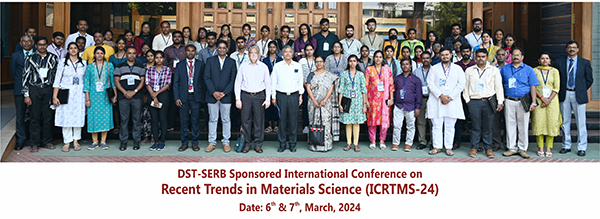
International Virtual Conference - ICRTMS 2023
Date: 07-03-2023
International Conference on Recent Trends in Materials Science started with the invocation followed by a welcome address by Dr Calitus Jude A L, Dean Faculty of Sciences. A brief overview of the conference was given by Conference Co-convenor Dr Shivaraj Maidur. Rev. Fr. Fr. Joshy Mathew, Director, Library and Information Centre, Director- HR Department, Head, Department of English in his inaugural address, highlighted the use of materials science in day-to-day life and its relevance in the development of new technologies, and also congratulated the department. The chief guest, Prof. Karuna Kar Nanda, Director, Institute of Physics(IOP), Bhubaneswar - 751005, India emphasized the relevance of research in materials science in the current scenario and the use of materials research in all the fields. The Conference abstract book was also released by the dignitaries.
One keynote session and three technical sessions were conducted. In the keynote session: Resource person Prof. Karuna Kar Nanda, Director, Institute of Physics(IOP), Bhubaneswar - 751005, who spoke on the topic of “Breathing of Nanostructured Materials” where he elaborated Adsorption of oxygen on materials surface is essential for a variety of applications including gas sensing, photodetection, pressure sensing, oxygen reduction reaction, oxidation and in monitoring several properties such as hydrophobicity, conductivity, nature of doping, work function and etc. He explained the key applications and properties of various carbon and oxide nanostructures associated with oxygen adsorption and provided a correlation among them.
In Technical session-1: Nonlinear Optical Applications of Novel Materials, by Prof. Reji Philip, Senior Professor, Ultrafast and Nonlinear Optics (UNO) Lab, Light and Matter Physics (LAMP) Group, Raman Research Institute Bangalore – 560080, India emphasized the second and third order nonlinear optical effects, experimental techniques and the application of some novel material in optical limiting devices. He highlighted some of the materials such as carbon nanotubes Fullerene and organic dyes for optical limiting applications. It was surely a very informative session.
In Technical session-2: Modelling the Mechanical Behaviour of Shape Memory Helical Springs, Dr R. Santhanam, Senior Scientist, Aerospace Structures Division, Defence Research and Development Laboratory (DRDL), Ministry of Defence, Hyderabad, India explained the behaviour of Shape Memory Helical Springs and described SMA springs can be used for high-performance soft actuation. Different characterizations of SMA springs were discussed. He presented a study on variation in coil diameter of SMA springs, the development of constitutive modes for SMA springs and the effect of geometric properties of bias springs actuation. The session was interactive and the speaker covered all key concepts.
Dr. Madan Kumar Shankar, Postdoctoral Researcher, Department of Physics, Uppsala University, Sweden elaborated on the Time-resolved Serial Femtosecond Crystallography of Photoactive Protein in detail, briefing her research and experiences.
Paper Presentation sessions were chaired by Dr Basavaraj Angadi, Professor, Bangalore University, Bengaluru, and Dr E. Parasuraman, Assistant Professor, Indian Academy Degree College, Bangalore. The papers reflected current trends in materials science and condensed matter physics, Solar cells, Superconductors, Nanoscience, and catalysis to name a few.
The conference was attended by more than 162 participants (within and outside the Nation) and a total of 55 technical papers (including eight posters) on various topics in materials science were received and out of which 38 (including six posters) papers were presented by the authors. All accepted and presented papers will be published in the Chemical physics impact journal (SCOPUS Indexed) and UGC-indexed journals.
After the paper and poster presentation Dr. Nagaraju, Vice President, of the Indian Association of Physics Teachers South zone gave concluding remarks about the keynote sessions, technical sessions and oral and poster presentations. He also announced the best papers and poster awards. Prof. Somasekara, Former Principal and IAPT member and Dr Nagaraju, Vice President, of the Indian Association of Physics Teachers south zone presented the cash prizes with certificates to the winners.
Outcome: ICRTMS 2023 was a good platform to discuss the recent trends in materials science and shared the experiences, perspectives and responses to the challenges faced by the researchers, and to set new goals for the future. The conference provided the participants with an opportunity to expand their network and exchange knowledge and ideas among fellow researchers, academicians and technical experts from diverse areas towards the common goal of shaping the future of society through materials research.
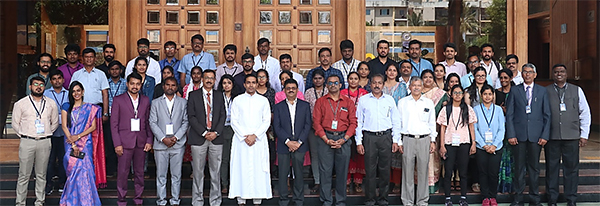
National Conference On Recent Trends on Electronics, Mathematics & Statistics - NCRTEMS’23
Date: 03-03-2023
Departmental Technical Sessions:
2.1 Electronics Technical Sessions:
The Electronics Department organized two distinct technical sessions that focused on different aspects of the field. The sessions aimed to cover a wide range of topics, including emerging technologies, circuit design, signal processing, and communication systems. Renowned experts in the field delivered insightful presentations, highlighting the recent developments and future prospects in electronics.
2.2 Mathematics Technical Sessions:
The Mathematics Department also conducted two technical sessions, each concentrating on diverse areas within mathematics. The sessions encompassed topics such as applied mathematics, mathematical modeling, optimization, and numerical analysis. Esteemed mathematicians and researchers shared their expertise, shedding light on the latest trends and methodologies in the field.
2.3 Statistics Technical Sessions:
The Statistics Department organized two technical sessions to explore various facets of statistics. The sessions covered areas such as data analysis, statistical modeling, machine learning, and statistical inference. Accomplished statisticians and data scientists presented their research findings, introducing novel techniques and approaches that are revolutionizing the field.
Paper Presentations:
Following the technical sessions, the conference featured paper presentations, where participants had the opportunity to present their research work and findings. Authors submitted their papers in advance, which underwent a thorough review process by the conference committee. The selected papers were then categorized based on their relevance to electronics, mathematics, or statistics.
During the paper presentations, researchers presented their work in front of a knowledgeable audience comprising fellow researchers, faculty members, and industry experts. Each presenter had a designated time slot to deliver their presentation, followed by a question-and-answer session, which encouraged valuable discussions and exchanges of ideas.
Keynote Addresses and Panel Discussions:
In addition to the technical sessions and paper presentations, the conference also featured keynote addresses by eminent personalities from the fields of electronics, mathematics, and statistics. These distinguished speakers shared their insights on the current trends, challenges, and future directions of their respective disciplines.
Furthermore, panel discussions were organized to provide a collaborative platform for experts and attendees to engage in thought-provoking conversations. These discussions revolved around specific themes and topics, allowing participants to delve deeper into the emerging trends and potential applications within electronics, mathematics, and statistics.
